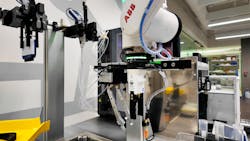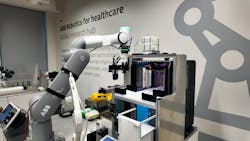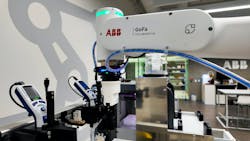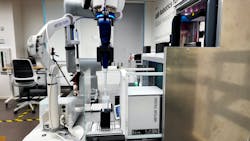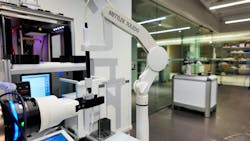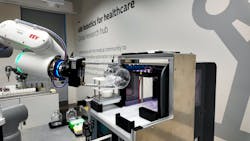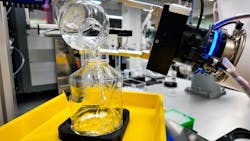Adoption of robotic lab technology could accelerate with automation partnership
ABB Robotics and Mettler Toledo have signed a memorandum of understanding (MOU) to integrate ABB robots with LabX, Mettler Toledo’s laboratory instrument management software (Figure 1).
The combination is designed to enable greater levels of efficient and high-quality automated laboratory workflows across a range of industries, making research, testing and quality control more flexible, while accelerating time-to-market and addressing labor shortages.
“In combining Mettler Toledo laboratory equipment with ABB’s collaborative robots, communicated through the LabX platform, we will support operations and enable the highest traceability, productivity and data management in the industry,” said Jose Manuel Collados, manager of ABB Service Robotics (Figure 2).
“By unlocking new possibilities in lab automation, our collaboration with Mettler Toledo will create efficiencies and unlock resources in pharmaceuticals, chemicals, food and beverage, semiconductors and battery industries,” said Collados.
With the collaboration, Mettler Toledo’s LabX software will seamlessly integrate into ABB’s OmniCore robot controllers, enabling LabX to orchestrate robotic lab workflows (Figure 3).
Combining the ABB robot capabilities with the data capture, method control and instrument management of LabX, could enable customers to increase lab productivity, reduce system complexity and fulfill data quality and safety and regulatory requirements. This is designed to relieve scientists and lab technicians of mundane, repetitive tasks; eliminate common errors; and optimize productivity, providing lab professionals additional time to pursue higher-value activities, such as data analytics.
"Great innovation starts at the bench, especially when you are able to minimize process times and human error while also supporting the generation of high-quality data and information," said Mettler Toledo’s head of laboratory division Stefan Heiniger (Figure 4).
"Mettler Toledo and ABB will provide a powerful, intuitive, and standardized toolset that meets the need of laboratories of all sizes and types that will deliver new levels of automation, speed and insights, while also reducing costs," said Heiniger.
The collaboration is part of ABB’s ongoing strategy to bring the benefits of automation to new segments worldwide and complements the work at the Life Sciences and Healthcare lab at the Texas Medical Center in Houston, as well as the newly inaugurated Open Innovation Lab for Life Science and Healthcare in Zhangjiang Robot Valley, Shanghai.
Mettler Toledo is showcasing its automation capabilities for analytical instruments, material characterization and weighing, as well as the LabX laboratory software at SLAS2024 in Booth 264 (Figure 6).
